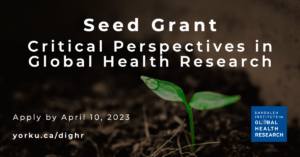Post
Published on July 12, 2024

The Dahdaleh Institute held its fifth annual Critical Social Science Perspectives in Global Health Research Workshop (CPGH) as a hybrid event on Wednesday, April 30, 2024. This year, 36 researchers came together to discuss advancements in global health, focusing particularly on transdisciplinary research that incorporates critical social science perspectives.
Professor Cary Wu presented the keynote address and reflected on three key aspects. The first being trust as a critical determinant of health. Next, he introduced the political sociology of health, which includes trust, democracy, and health. In his third reflection, he shared a very specific study that focuses on an empirical illustration: a triple trust penalty. Following Prof. Wu's presentation, participants engaged in a Q&A session, which included a compelling exploration of methods for measuring trust. This discussion delved into various metrics and approaches for quantifying trust within societies and further examined how social and economic inequalities diminish the levels of trust people have in one another, highlighting the intricate connections between inequality, trust, and overall societal well-being.
Following this, the 2023 CPGH seed grant recipients presented the progress of their global health research projects that cover a wide range of themes including mental health, health inequality, and planetary health.
Godfred Boateng (1:25:20) focused on anxiety interventions for Black families in the criminal justice system. Following, Syed Imran Ali and Stephanie Gora (1:42:34) discussed the "Safe Water Optimization Tool" and its applications in the Canadian North and First Nations communities in Ontario, focusing on public health improvements through safe water access. Chloe Clifford Astbury and Nilanjana Ganguli (1:55:25) assessed the impacts of the green energy transition on the mining sector and related health outcomes, emphasizing environmental health concerns. Next, a Q&A session (2:13:00) where participants engaged the presenters with questions, discussing the implications and applications of their research. Then York researchers delivered a brief presentation on their current research projects that take a critical social science approach to global health. Ingrid Pechenkov (2:37:12) spoke about the relationship between mental health and gender identity on a continuum in the Canadian context. Lastly, Shamim Samadi (2:42:25), presented her research on the relationship between hosting sport mega-events and the policing of sex workers, migrant women and gender-diverse people through anti-trafficking measures.
Watch the workshop recording below:
This year’s CPGH workshop demonstrated the astounding work York researchers are conducting and the critical problem-solving approach they are taking. The CPGH Program continues to support these endeavours with the CPGH Seed Grant Program which awarded four selected applicants seed grants (worth up to $7,000 CAD each).
Themes | Global Health & Humanitarianism, Global Health Foresighting, Planetary Health |
Status | Active |
Related Work | |
Updates |
N/A
|
People |
James Orbinski, Director - Active
Syed Imran Ali, Research Fellow, Global Health and Humanitarianism - Active Stephanie Gora, Faculty Fellow, Lassonde School of Engineering - Active Godfred Boateng, Faculty Fellow, Faculty of Health - Active Chloe Clifford Astbury, Research Fellow, Global Food System & Policy - Alum Nilanjana Ganguli, Dahdaleh Global Health Graduate Scholar, Faculty of Environmental and Urban Change - Active Shamim Samadi, Wellness Impact Lab, Global Health Intern [W23;FW23-24] - Alum |
You may also be interested in...
Recap — Systems Approach to Address Resource Insecurity and Health Inequities, with Godfred Boateng
On October 23, Dahdaleh faculty fellow Professor Godfred Boateng examined how interconnected systems such as food, water, energy, and housing insecurity impact public health, particularly within vulnerable communities. Professor Boateng used the analogy of blind ...Read more about this Post
Global Strategy Lab awarded $8.7M to create AMR Policy Accelerator
Antimicrobial resistance (AMR) is one of the greatest threats humanity faces today. Decades of use, overuse and misuse of antimicrobials in animals and humans has led to the development of bacteria, viruses, fungi and parasites ...Read more about this Post
Recap — The Benefits of Self-Healing on Our External Environment and Relationships With Others
For most of us, our daily life continues to grow more difficult with challenges such as climate change, political instability, the aftermath of the COVID-19 pandemic, and a global sense of approaching doom. Now more ...Read more about this Post



